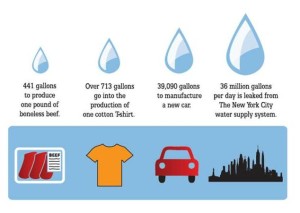Today’s case study got me thinking about the water that goes into other products that we use. This chart is pretty blurry but I got it from http://factsaboutbeef.com/2013/04/11/the-reality-of-water-management-raising-cattle/ It shows the comparison of how much water goes into a pound of boneless beef (our figures are higher than these, but this website is designed to show progress in farming techniques in order to conserve water.)
According to the chart, the water that goes into the production of ONE cotton t-shirt is 713 gallons and the water that goes into the production of ONE pound of boneless beef is 441. That got me thinking about how large of a difference we make by consumption. Curbing meat intake whenever it’s possible makes a difference. Cutting back on buying new clothing also makes an extremely large impact. Our class roster says that we have 40 students. Say that our class makes a decision to cut back on meat and cut back on buying new clothing. If each student refrained from buying 2 pounds of beef and 2 new shirts a month, this is what the results of our classroom “boycott” would look like:
1 Student: SUBTRACT 2lbs BEEF SUBTRACT 2 T-SHIRTS
441Gal X 2 lbs =882 Gallons of Water Saved 713 Gal X 2 lbs = 1426 Gallons of Water Saved
1 Student Saves (882 Gal + 1426 Gal =) 2,308 Gal of Water each month through curbing their consumption.
2,308 Gal of Water X 40 Students = 92,320 Gal of Water
If the class of 40 students of curbed their consumption through cutting back by 2 lbs of meat each month and 2 new t-shirts a month, AS A CLASS, we would save about 90,000 gallons of water.


This post and Ashley’s comment got me thinking about clothing related waste. Representatives of various student organizations at the HUB, and businesses give away so many free advertisement t-shirts. I used to volunteer at a charity thrift store and we would get bags and bags of advertisement t-shirts. It appears investment in such a product for advertisement would yield a poor marketing outcome since people don’t really wear them and they are left to be disposed of. I’m not sure exactly how effective ugly billboard t-shirts are, but convincing businesses to find other most environmentally friendly and cost-effective forms of advertisement will also help reduce clothing-related waste.
One of the most interesting promotional freebie was actually made out of reclaimed clothing. It was a pencil partially comprised of ground up denim instead of wood. The idea behind it was so cool, I held onto it. What if we also decreased the flow of clothing-related waste by getting businesses to switch to cool ideas like this? Reducing production of clothing while increasing outflow of clothing waste that is otherwise sent to incinerators and landfills, would assist in the boycott efforts.
That’s extremely surprising how huge of a difference we can make from something so simple as cutting back 2lbs of meat and 2 new tshirts. You’d never think that something so small would have such a large impact. It’s similar to garbage waste and recycling. If everyone recycled instead of wasting easily recyclable products, it would make an incredibly huge impact on our environment. Recycling is so simple, something even mindless, and it could save our planet!
http://homeguides.sfgate.com/effects-recycling-humans-79735.html
It was very interesting to see the size of an impact our small class could have on water consumption by making some very small changes. It is truly incredible that just 40 people can save 90,000 gallons in a month.
This post got me thinking about the amount of “free” t-shirts given out by the University and various clubs over the course of the year. For instance, this year every freshman student was given as t-shirt with their college on it for the Convocation at the beginning of the year. That’s over 9,000 just then. Not to mention how much meat is wasted in the dining commons at the end of each meal. As someone who works at one of them, I can say that it makes me sick to see how much perfectly good food we dispose of. Sure we compost it, but it seems like a huge waste of food and water to just get rid of it.